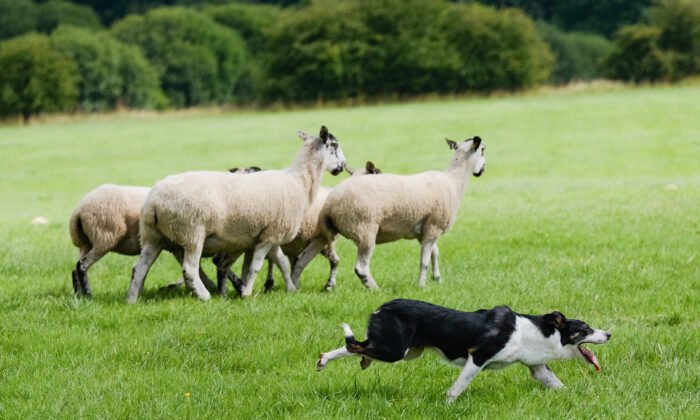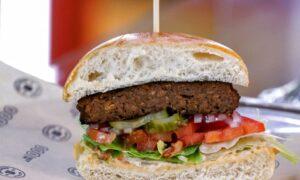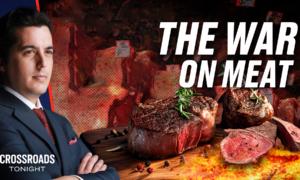CEO Proposes Lab Grown ‘Meat’ as Replacement for Traditional Pet Food in the UK
A synthetic lab-grown “meat” product is about to hit the market in the United Kingdom—with its first customers being British dogs.
The start-up Meatly claims its imitation meat-like pet food will have all the benefits of meat from living, breathing animals without the environmental impact of traditional meat products that come from farm-raised livestock.
“We chose the name ‘Meatly’ because we wanted to celebrate the fact that it is real meat, made the new way,” Owen Ensor, chief executive officer of Meatly, announced in a press release. “Our hope is that Meatly will quickly become a household name, loved by pets and pet parents alike, and recognised as the choice for healthy, sustainable, delicious pet food.
“The team makes real meat, without animals taking a sample of cells from a chicken egg just once. Meatly can produce enough meat to feed furry customers forevermore,” he added.
Mr. Ensor says that while dogs may desire red meat from live animals, the production and consumption cycle involved in “old fashioned meat,” as he calls it, hurts the environment in ways that negatively affect the soil for future generations, as well as the weather.
“Our pets love meat, but old-fashioned meat, produced through factory farming, requires a huge amount of land, water and antibiotics and is a key cause of environmental degradation,” said Mr. Ensor. “We need cultivated meat now more than ever.”
The company has said it hopes its sustainable dietary efforts for pets will one day be the “meat” source not just for pets but also for the entire British population.
“Pet food is the natural starting point, given consumers’ excitement. We’re thrilled to be at the heart of the future of meat production in the UK,” said Mr. Ensor.
After what it hopes will be a successful UK launch, Meatly plans to expand its line of synthetic “meat” products into other markets, including the United States.
However, the company should expect to face resistance as a debate has erupted in the United States over whether the lab-grown product should be defined and labeled as meat.
‘It Isn’t Meat’
Justin Tupper, president of the United States Cattlemen’s Association, told The Epoch Times that calling the chemical creation meat would be the equivalent of false advertising.
“They are trying to sell a facade that this chemical-laced cell-cultured product is somehow safer and better than meat, but it isn’t meat and shouldn’t be called meat,” said Mr. Tupper. “To say otherwise simply isn’t being honest with the consumer.
“There is absolutely no way I would ever feed this product to my dog, a person, or any living creature,” he added.
Synthetic meat-like products are created by taking cells acquired from animals and placing them in a warm, sterile area—usually, a metal vat—where they are then combined with a solution of chemicals that causes the cells to double once a day.
Several attempts by The Epoch Times to contact Meatly have not been returned by the time of publication.
The synthetic “meat” market has already arrived in the United States.
While a decision over the labeling of the product—and if it will allow itself to be called meat—has yet to be announced, the cattle industry plans on being aggressively proactive in both discussions with the USDA and, if needed, litigation.
The demand for synthetic meat has been mainly spurred by corporate entities and government agencies working in tandem with the environmental movement.
Bill Gates, an investor in Upside Foods, one of the two synthetic meat producers approved by the USDA, believes meat alternatives are needed to save the world from upcoming catastrophic climate events caused by greenhouse gasses.
“All rich countries should move to 100% synthetic beef. You can get used to the taste difference, and the claim is they’re going to make it taste even better over time,” Mr. Gates told the interviewer.
“Eventually that green premium is modest enough that you can sort of change the people or use regulation to totally shift demand. So for meat in the middle-income-and-above countries, I do think it’s possible,” he said.
Mr. Tupper rejects the idea that synthetic “meat” is more environmentally friendly and claims the chemicals involved during the production process can be toxic. American cattlemen will continue to fight to protect the definition of the word meat from producers of synthetic cellular-based beef alternatives for both people and pets, he added.
“It’s a firm red line for all of us,” said Mr. Tupper. “We aren’t afraid of competition, but they should not be able to call this product meat and ride off the shirttails of generations of cattlemen.
“Nothing can replicate real good, nutrient-rich meat, and the American consumer needs to understand that,” he added.






